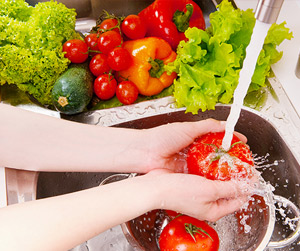 One in six Americans gets sick from eating contaminated food each year, according to the CDC. There are more than 250 food-borne illnesses that can be caused by bacteria, viruses, and parasites (including E. Coli, Salmonella, Norovirus, Campylobacter, and Staphylococcus aureus). Common symptoms include nausea, vomiting, stomach cramps, and diarrhea.
One in six Americans gets sick from eating contaminated food each year, according to the CDC. There are more than 250 food-borne illnesses that can be caused by bacteria, viruses, and parasites (including E. Coli, Salmonella, Norovirus, Campylobacter, and Staphylococcus aureus). Common symptoms include nausea, vomiting, stomach cramps, and diarrhea.
For gastric sleeve, gastric bypass, and lap band patients who still struggle to drink at least 64 ounces of water each day, experiencing symptoms of food-borne illnesses can put you at increased risk of dehydration.
The best solution is to try to prevent food-borne illness. The CDC has outlined four steps to take to help prevent food poisoning:
- Clean: Wash your hands for at least 20 seconds before, during, and after preparing food and prior to eating. Wash your utensils, cutting boards, and countertops, and work surfaces with hot, soapy water. Rinse fruits and vegetables under running water before cutting or eating them.
- Separate: Use separate plates or cutting boards for raw meat, poultry, seafood. Never put cooked meat back onto the same plate it was on when it was raw unless you’ve washed it in hot, soapy water. Use different utensils or knives when preparing food to prevent cross-contamination from raw foods to cooked foods. When grocery shopping, separate your raw meats from other foods to prevent contamination. Don’t store raw meat, poultry, and seafood high up in the fridge where their juices could drip onto other foods below. Keep them on lower shelves and separate from other foods.
- Cook: The best way to kill potentially dangerous bacteria, viruses, and parasites is to cook foods to the proper temperatures. This can not be judged by time or color, you must use a thermometer.
- 145 degrees - whole cuts of beef, pork, veal, or lamb and fish.
- 160 degrees - ground beef or ground pork.
- 165 degrees - all poultry, casseroles, and leftovers.
Chill: Keep your refrigerator at 40 degrees or cooler. Refrigerate perishable foods promptly (ideally within two hours). Thaw frozen foods in the refrigerator, in cold water, or in the microwave. Or skip the thawing process and cook it straight from frozen in your Instant Pot, pressure cooker, or crockpot.
Bacteria multiply rapidly when food is left between 40 and 140 degrees, so it’s best to thaw it properly, cook it thoroughly, and chill it promptly. Do not be afraid to throw out foods that are questionable, including leftovers. You can not always see or smell the bacteria. Remember the old adage “When in doubt, throw it out.” Following proper food safety can help prevent many cases of food poisoning, which is important for weight loss surgery patients, but also for their family, friends, and loved ones. Food-borne illnesses most often resolve on their own, but they can also result in hospitalization and death in some circumstances and should be treated seriously.
This food safety reminder is offered by Dr. Shillingford, MD, PA, a board-certified surgeon specializing in bariatric surgery and advanced laparoscopic surgery, including hernia repair, gallbladder removal, appendectomy, and other gastrointestinal surgeries. His gastric sleeve, gastric bypass, and lap band patients receive pre-surgical preparation and post-surgical follow-up care to ensure weight loss success. To register for Dr. Shillingford’s free informational session to learn more about gastric sleeve, gastric bypass, and lap band surgeries, please call his Boca Raton office at (561) 483-8840 today.

 Am I A Candidate
Am I A Candidate  BMI Calculator
BMI Calculator  Why Choose Us
Why Choose Us